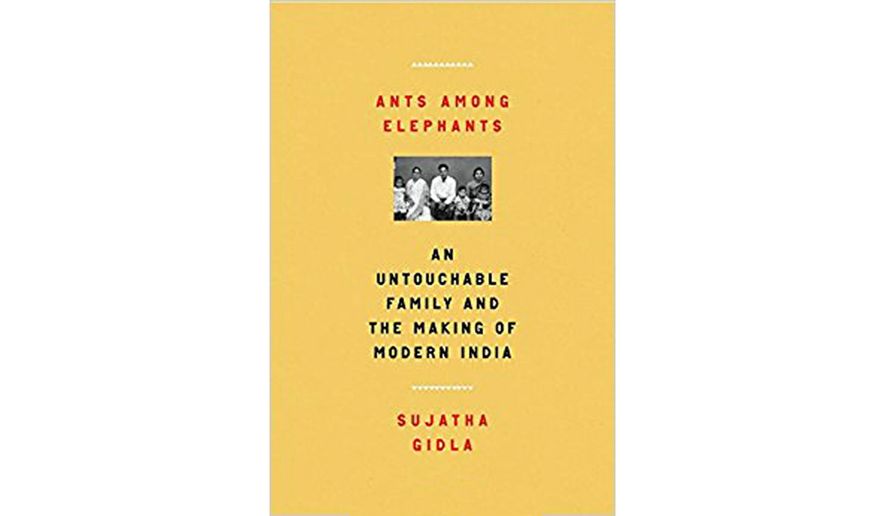OPINION:
ANTS AMONG ELEPHANTS: AN UNTOUCHABLE FAMILY AND THE MAKING OF MODERN INDIA
By Sujatha Gidla
Farrar, Straus and Giroux, $28, 308 pages
History is a bit like sedimentary rock. Viewed from a distance it appears solid, consistent and stable. But subject it to heavy scrutiny — and perhaps a few skeptical taps — and you discover layer upon fragile layer of differing often conflicting elements you’d never guess were there. This is particularly true of the history of the Indian subcontinent, never completely united and overrun by wave after wave of alien masters.
Pockets of primitive, aboriginal tribes and their descendants, the “adivasi,” still make up 8.6 percent of India’s population, more than 100 million people. A dwindling number are still hunter-gathering forest dwellers whose dialects, customs, religion and physical characteristics set them apart from even the earliest Aryan occupants of the subcontinent and the ancient origins of Hinduism itself.
For thousands of years — and to a large extent today — they have been segregated at the lowest layer of Indian society, confined to the most degrading, often filthy jobs. This includes the “sweepers” who still have to clean human waste from primitive dry latrines by hand in much of rural India.
Despite various legal protections designed to open up educational and career opportunities to them, many of these “untouchables,” or, as Mahatma Gandhi called them, “harijans” (“Children of God”) still live beyond the pale, in conditions of near slavery. Even today, especially in remote areas, it is not unheard of for an untouchable to be beaten to death by an angry mob just for drawing water from a village well. Their very touch is considered polluting and they are often forced to live outside village limits in squalid, unsanitary settlements.
Small surprise, then, that when Christian missionaries began evangelizing during the colonial period, the untouchables were the one group that flocked to them in large numbers. Beginning as what used to be called “Rice Christians,” converted out of hunger rather than conviction, many gradually became sincere believers whether converted by early Catholic or later Anglican and Protestant missionaries.
The brightest among them took advantage of missionary schools and colleges that allowed them, for the first time, to become teachers, doctors, engineers and attorneys, though still facing much hostile prejudice.
Sujatha Gidla’s grandparents were among the first generation of untouchables to make the transition in large numbers. Her compelling, often moving memoir — powerful in its very simplicity — conveys just how terrible the obstacles they faced were. I use the word “faced” rather than “overcame” because much of their progress was made while still having to endure or, at best, circumvent, humiliation and persecution on an almost daily basis. That Sujatha Gidla can objectively describe the compromises and the conflicted emotions involved, as well as the struggle itself, adds value and integrity to her work.
This is most true of her personal recollections, recounting the things she either witnessed or experienced firsthand. As she folds in family legends and depicts the political turmoil that attracted men like her mother’s brother, K.G. Satyamurthy (“Uncle Satyam” in the book, a brilliant, eccentric, and thoroughly Dickensian character who began as a poet and ended as a leader of a botched but bloody Marxist-Naxelite revolutionary movement in southern India), the narrative occasionally reads more like a sincere but misguided Marxist manifesto.
Admirable as he was in many ways, her uncle, who so clearly saw the injustices inflicted by the wealthy landlord class on rural untouchables and other landless peasantry, was a blind follower of first Josef Stalin and then Chairman Mao. Keenly aware of what was wrong in his own backyard — he originated the title phrase “Ants Among Elephants” borrowed by his niece to characterize the plight of the untouchables — he willfully ignored the colossal crimes against humanity committed by his political mentors.
It is probably just as well that his insurrection failed. Had he succeeded, he might have followed in Mao’s footsteps — or even those of Pol Pot in Cambodia — inflicting ever more savage reprisals in his determination to create an unattainable Marxist utopia. Sujatha Gidla herself, after serving time as a political prisoner in India, came to America to finish her education. While she says that she still would like to see a global revolution to eliminate poverty, she has given up the revolutionary underground in India to work underground in New York City as a subway conductor. One hopes that she has found a good life in America, and that this promising first book will not be her last.
• Aram Bakshian Jr., an aide to Presidents Nixon, Ford and Reagan, writes widely on politics, history, gastronomy and the arts.




Please read our comment policy before commenting.